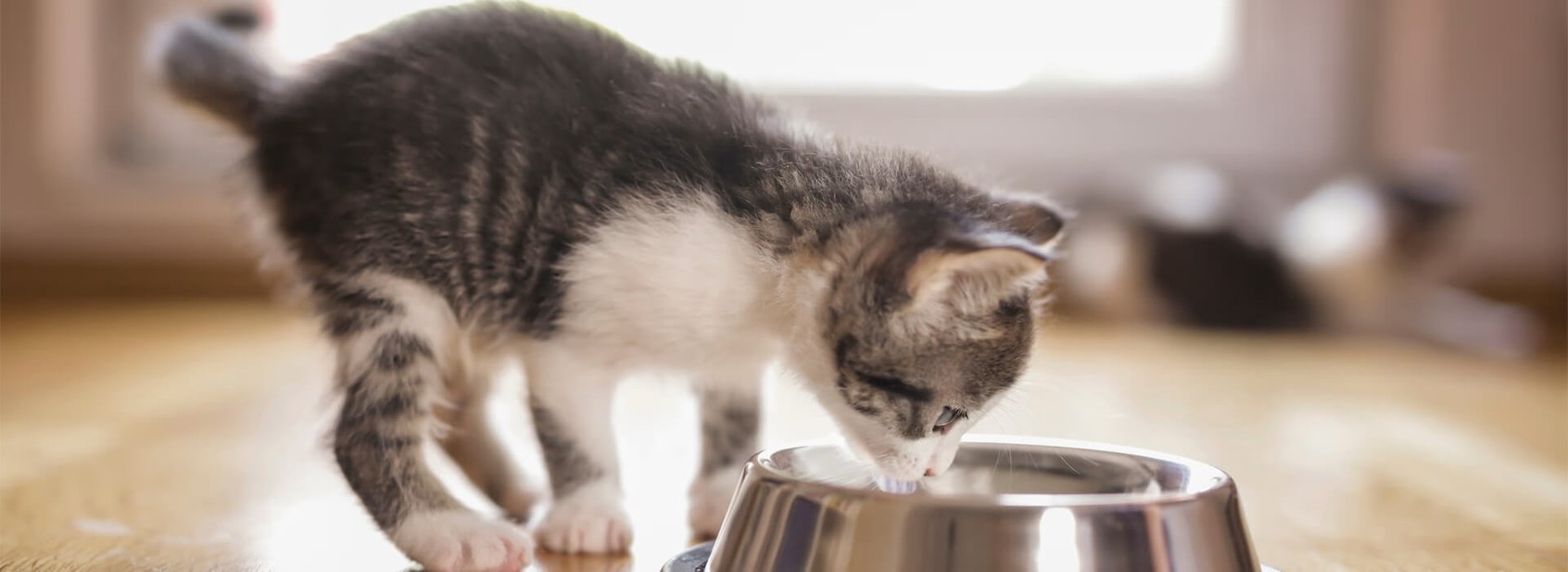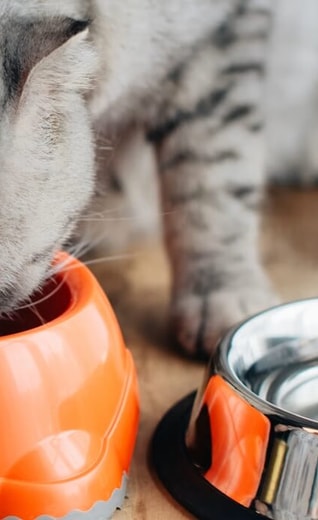
Your guide to a healthy kitten
Making things comfortable
Before you check your kitten over, choose somewhere she feels comfortable – like your lap or on a bed. While you’re examining her, be as gentle as you can, and use lots of soft, reassuring words.
Breathing and abdomen
Listen to your kitten’s breathing, making sure that it's regular and not strained in any way. Very gently, run your hands along her sides, checking for anything that seems unusual.
Ears and eyes
Look into your kitten’s ears, checking for any scratches to the outer ear, inflammation or dark-coloured wax. Around your kitten’s eyes, look for discharge, inflammation or signs of injury. Never touch the eyeball, and don't put drops in without speaking to your vet.
Mouth and nose
Gently open your kitten’s mouth and look for broken teeth, inflamed gums or a build-up of plaque deposits. Your kitten’s nose is a good indicator of her general health – it should be cool and moist. If your kitten has a crusty nose or is sneezing a lot, she may have a cold. If you're at all worried, just book her into the vet for a more thorough check-up.
Claws
Check your kitten’s paws to see if she has any broken or missing claws. You’re also looking for injuries to the soft skin between her pads. Gentle pressure on her foot will unsheathe her claws – remember they’re sharp!
Speak to your vet
If you're worried about anything, keep an eye on your kitten for a day or two. If you're still not happy with how she is after that, give your vet a call.
See More Articles Like This

Grooming: Coat care and dandruff elimination
A cat's skin and fur is nourished from the inside, so the most important thing you can do to achieve a healthy coat is to feed your cat a complete and balanced diet that is enriched with all of the nutrients they need to maintain a healthy coat and skin. Here’s a list of things to consider in caring for your cat’s skin and coat:Does your cat have any bald patches? Red, inflamed or sore skin? Matted fur, damp patches of skin? Itchy skin, scabs or bleeding patches? If so, they should be taken to the vet to start appropriate medication.Some cats can be allergic to parasites such as flea bites. Once treated, this can be prevented with regular flea prevention treatment.It’s also advisable to keep on top of worm prevention treatment as internal parasites can stop your cat from absorbing all of the nutrients from the food.Regular cat grooming is important. Cats love to be groomed and enjoy regular brushing to keep their coat clean and in good, tangle free condition. This is particularly important for long-haired cats.Watch their weight , if cats become overweight, they can struggle to reach their entire coat for daily cat grooming and dandruff may begin to appear.Under normal circumstances there is no need to bathe a cat, which is good because most cats hate it!Cats’ claws naturally shed and shouldn’t need cutting. It’s important that cats maintain sharp long claws as they use them in daily activities like climbing. If you are concerned about your cat's claws take them to see your local vetfor advice.
READ MORE
What is a healthy diet for cats?
In the wild, big cats know exactly what they need to eat. By feeding cats the right food at the right life-stages of life, we support their natural instincts as a carnivore and solitary hunter.Ensure kittens eat special kitten foodFor the first 4–5 weeks of their life, kittens get everything they need to survive from their mother. Kittens are normally weaned by 7 weeks old, but even from week 4 they can start eating a specially prepared kitten food like WHISKAS® PERFECT PORTIONSTM Kitten Chicken Pate Entrée.Kittens have a small tummy but a big appetiteKittens are cute and small, but they grow very quickly. In fact, they grow up to 15 times faster than a human baby! However, with a stomach that starts out as the size of your thumbnail, they can't eat very much in one go. That's why it's important to feed kittens small meals at regular intervals – up to 6 times a day to begin with. In the early days, we advise spreading the food out on to a plate so kittens learn to lick the food and get a taste for it.From kitten portions to cat portionsFrom about 4 months old, one WHISKAS® PERFECT PORTIONSTM Kitten Chicken Pate Entrée is perfect for a single tasty meal. Kittens should be fed 3–4 meals each day until they are 6 months old. After that, 2–4 meals a day are recommended. At 12 months old, kittens are ready for adult food, which can be fed twice a day. Most cats enjoy wet food being served morning and evening with a bowl containing their daily allowance of dry food being left out to graze on during the day.Cats are careful eatersIn the wild, big cats are careful eaters, avoiding anything that tastes “off”. Casts and kittens share those instincts and prefer every meal to be fresh and, served at room temperature in a clean bowl.Don’t suddenly change your cat’s dietIntroduce any new food gradually and a little at a time, as sudden changes might upset a cat’s sensitive digestive tract.Should cats drink cow’s milk? After kittens are weaned, they lose their ability to digest milk – so contrary to popular belief, cats should not be given cow's milk to drink! However, at WHISKAS®, we know that owners like to treat their cats to something special so we’ve created a safe version of milk that cats love.Encourage your kittens to drink waterCats need water, so it’s best to get them drinking it from a young age. Kittens have a super-sensitive nose and tongue that will easily pick up unfamiliar chemical smells. To encourage kittens to drink more, place their water bowl in a quiet spot away from the litter tray and away from anything with any odours that may offend them.A healthy coat often means a healthy catA shiny coat, bright eyes and supple muscle tone are all good signs that a kitten or adult cat is healthy. If you feed complete and balanced food that's right for every stage of your cat’s life, it will be reflected in their appearance.Feeding your cat a mixture of wet and dry foodCats seek variety in their food and enjoy different flavours, tastes and textures in their diet. Mixing wet and dry complete and balanced cat food, that is appropriate for your cat’s life stage and lifestyle, is a great way to keep your cat happy and healthy.Wet food encourages water intake. With high moisture content it can help keep your pet hydrated and helps to support a healthy urinary tract especially in cats.Wet food contains fewer calories per gram than dry food. It can help to maintain a healthy body weight.Wet food is closer in texture to the food that cats would naturally choose. It’s very palatable and easily digested making it the right choice for finicky eaters.Wet food delivers a variety of tastes and textures. Compared to dry foods, wet foods have higher levels of real meats and lower levels of carbohydrate sources, such as grains.The soft texture of wet food is easy for kittens and senior cats to chew.Benefits of Wet Pet Food Wet food encourages water intake. With high moisture content it can help keep your pet hydrated and helps to support a healthy urinary tract especially in cats.Wet food contains fewer calories per gram than dry food. It can help to maintain a healthy body weight.Wet food is closer in texture to the food that cats would naturally choose. It’s very palatable and easily digested making it the right choice for finicky eaters.Wet food delivers a variety of tastes and textures. Compared to dry foods, wet foods have higher levels of real meats and lower levels of carbohydrate sources, such as grains.The soft texture of wet food is easy for kittens and senior cats to chew.Benefits of Dry Pet FoodDry pet food is a concentrated source of nutrition and energy.Chewing the crunchy kibble helps support oral care health.Dry pet food is usually less expensive than wet to feed on a per-serving basis.Dry pet food is convenient, it does not require refrigeration after opening, and can be left out in a bowl all day without the risk of drying out or going stale. Makes traveling with your pet much easier, too.
READ MORE
Cat’s Ears, Eyes And Skin
Your cat’s eyes and ears are highly sensitive, just like those of her big cat cousins in the wild. Sharp eyesight makes her a natural hunter, while her acute hearing helps her pick up the tiny sounds of her prey moving around.While it's important to visit the vet if you’re worried about your cat’s health, there are some basic checks you can do at home to make sure her eyes, ears and skin are in tip-top condition.HEALTHY EYESTo check your cat’s super-sharp eyes, just follow this simple checklist:Gently pull down your cat’s lower eyelid – the area you see here should be pinkCheck that both your cat’s pupils are a normal sizeStand with your cat next to a daylit window, open and close the curtains, and check how that her pupils react normally to the changing lightCheck your cat’s eyes for coloured discharge, or excessive watering – both signs might mean she’s picked up an eye infectionIf your eye checks reveal anything unusual, take your cat to the vet for a full check-up.HEALTHY EARSIf your cat's spending a lot of time shaking her head or scratching at her ears, there could be something wrong. Here’s how to check your feline friend’s ultra-sensitive ears:Keep her ears generally clean and free of dirtCheck to see if your cat’s ears are a brighter pink than usualStrong odours could indicate an ear infectionWax – especially dark wax or goo – might be a sign of an ear infection or ear mitesInfections caused by mites are relatively easy to cure using eardrops or a special 'spot on' applied to your cats shoulder blades. If there are any other cats in the house, it's a good idea to treat them too. Your vet will advise you about what treatment is best for your cat.Other possible conditions include a cauliflower-like thickening of the outer ear – this will need to be cleaned regularly – or a sudden swelling of the ear flap, which might be a blood blister, usually caused by scratching. Blood blisters sometimes cause the ear flap to scar and crumple, which could damage your cat's hearing – these might need an operation to sort them out. Finally, polyps are fleshy lumps which can prevent air flowing into cat’s ear, leading to illness. These too can be dealt with by surgery.If you’re at all concerned about the health of your cat’s ears, take her straight to the vet.HEALTHY SKINIf you notice your cat licking or scratching herself more than usual, she may have a skin condition. Eczema is a possibility – it’s often caused by an allergic reaction to flea bites. Left untreated, it will cause scabs to develop, giving your cat’s coat a gritty feel. And unfortunately all that extra licking will just make things worse! Your vet will be able to advise you about the best treatment.There’s also a chance that your cat’s itchy skin is caused by a food allergy. If so, your vet will help you move your cat on to a different diet.
READ MORE
Cat Weight
In the wild, big cats eat only the prey they catch. Your cat is a natural hunter too, however she relies on you to feed her the kind of balanced diet she needs to stay healthy … and the right weight. But it can be hard to resist the pleading look in those big eyes, and treating can be an important part of playtime. So take a moment occasionally to check your cat’s weight, and make sure she hasn’t been over-indulging!WEIGHING INChecking your cat’s weight couldn’t be simpler – just use your bathroom scales. First, weigh yourself. Then step on the scales again, this time holding your cat in your arms. Subtracting the first number from the second will give you the weight of your cat!CHECKING HER OVERIt’s also a good idea to look for changes in your cat’s body weight. You can do this by standing directly above her and looking down. If you can you see a slight "waist" behind her ribs, she may be overweight. Look too for pouches of fat between her hind legs, and under her belly.Alternatively, place both hands on your cat’s sides. If you can feel her ribs, your feline friend is the perfect weight. But if her ribs are actually sticking out, she's too thin.HELPING AN OVERWEIGHT CATIf your cat is beginning to look a bit podgy, your vet will be able to suggest a diet plan. It's better for your cat to eat little and often, so try giving her four small meals a day, instead of two big ones. And you’ll probably need to put a stop to all those treats and snacks!Just like her big cat cousins, your cat thrives on plenty of exercise – and this can help her shed weight too. Get your cat used to the idea with short bursts of playful activity. Then gradually extend her playtime, adding five minutes here and there, until she's getting a full workout.HELPING AN UNDERWEIGHT CATIf you think your cat is underweight, ask your vet for advice about how much, and how often, to feed her. If she doesn’t improve, she might be poorly, so take her back to the vet for a check-up.
READ MORE


